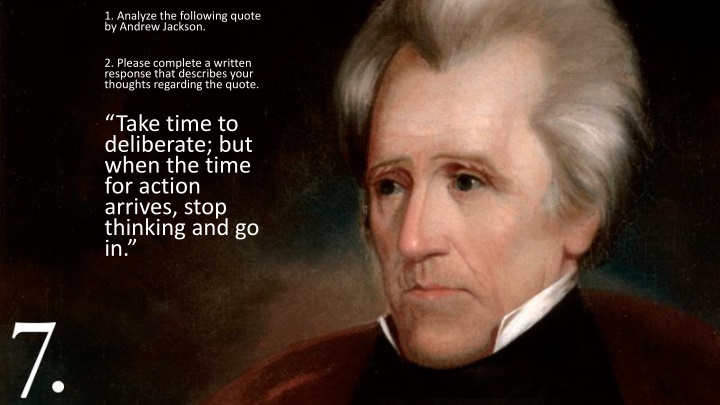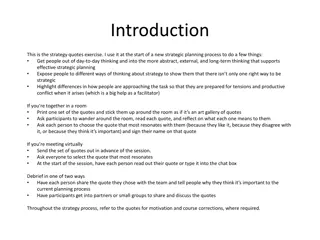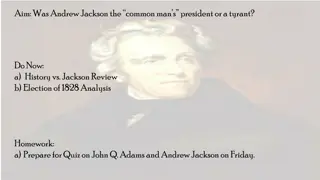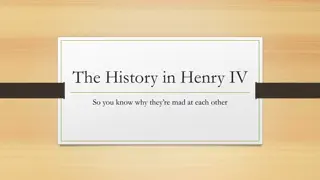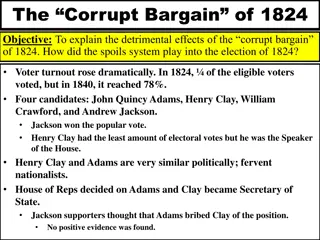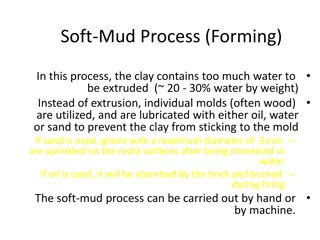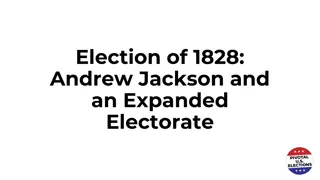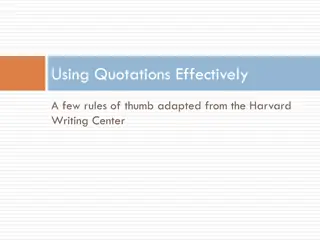Reflection on Quotes by Andrew Jackson and Henry Clay
Reflecting on the quotes by Andrew Jackson and Henry Clay, it's evident that both emphasize the importance of decisive action and standing for what is right. Jackson urges individuals to act swiftly when the time comes, while Clay prioritizes being right over holding power. These quotes highlight the values of integrity, leadership, and moral responsibility.
Download Presentation

Please find below an Image/Link to download the presentation.
The content on the website is provided AS IS for your information and personal use only. It may not be sold, licensed, or shared on other websites without obtaining consent from the author.If you encounter any issues during the download, it is possible that the publisher has removed the file from their server.
You are allowed to download the files provided on this website for personal or commercial use, subject to the condition that they are used lawfully. All files are the property of their respective owners.
The content on the website is provided AS IS for your information and personal use only. It may not be sold, licensed, or shared on other websites without obtaining consent from the author.
E N D
Presentation Transcript
1. Analyze the following quote by Andrew Jackson. 2. Please complete a written response that describes your thoughts regarding the quote. Take time to deliberate; but when the time for action arrives, stop thinking and go in.
1. Analyze the following quote by Andrew Jackson. 2. Please complete a written response that describes your thoughts regarding the quote. Americans are not a perfect people, but we are called to a perfect mission.
1. Analyze the following quote by Andrew Jackson. 2. Please complete a written response that describes your thoughts regarding the quote. Any man worth his salt will stick up for what he believes right, but it takes a slightly better man to acknowledge instantly and without reservation that he is in error.
1. Analyze the following quote by Henry Clay. 2. Please complete a written response that describes your thoughts regarding the quote. I would rather be right than President.
President Andrew Jackson: President Andrew Jackson: The Era of Jacksonian Democracy The Era of Jacksonian Democracy PRESENTED BY: THE HHS U.S. HISTORY DEPARTMENT
ENGAGEMENT INSTRUCTIONS ENGAGEMENT INSTRUCTIONS 1. Students will examine the standard ,essential question(s) and the key vocabulary terms. 2. Students and instructor(s) will watch a video relevant to Andrew Jackson.
GEORGIA STANDARDS OF EXCELLENCE SSUSH7: Investigate political, economic, and social developments during the Age of Jackson.
LEARNING TARGETS 1. Students will be able to explain the importance of the Era of Jacksonian Democracy. 2. Students will be able to describe the key components of Henry Clay s American System.
LESSON ESSENTIAL QUESTIONS 1. Explain Jacksonian Democracy, expanding suffrage, the rise of popular political culture, and the development of American nationalism. 2. Analyze and describe Henry Clay s American System. Compare and contrast it to Jacksonian Democracy.
MINI-LESSON: KEY VOCABULARY TERMS What words and people do I needtoknow? President Andrew Jackson Nullification Crisis Indian Removal Act Henry Clay Jacksonian Democracy The American System American Nationalism Suffrage
A person wearing a suit and tie Description generated with very high confidence PRESIDENT JACKSON INTRODUCTION VIDEO
Explore, Explain, and Elaborate Plan of Action Explore, Explain, and Elaborate Plan of Action 1. Students and instructor will review GSE and LEQ. 2. Students will work in whole group and then in small groups to analyze key concepts relevant to the Era of Jacksonian Democracy.
LEARNING TARGETS 1. Students will be able to explain the importance of the Era of Jacksonian Democracy. 2. Students will be able to describe the key components of Henry Clay s American System.
GEORGIA STANDARDS OF EXCELLENCE SSUSH7: Investigate political, economic, and social developments during the Age of Jackson.
MINI-LESSON: KEY VOCABULARY TERMS What words and people do I needtoknow? President Andrew Jackson Nullification Crisis Indian Removal Act Henry Clay Jacksonian Democracy The American System American Nationalism Suffrage
Election of 1824 ANDREW JACKSON from TN (West) Electoral vote = 99 Popular vote = 153,000 JOHN QUINCY ADAMS from MA (North) Electoral vote = 84 Popular vote = 108,000 WILLIAM CRAWFORD from GA (South) Electoral vote = 41 Popular vote = 46,000 HENRY CLAY from KY (West) Electoral vote = 37 Popular vote = 47,000
Electoral Voting 1824 Electoral Vote % Clay 14% Jackson 38% Crawford 16% A. Jackson J.Q. Adams Adams 32% W. Crawford H. Clay
How do we arrive at a winner? Total Electoral Votes in U.S. in 1824= 261 A majority is needed to win = 131 electoral votes. None of he candidates had a majority, so the decision would be decided by the House of Representatives (from the top 3). Henry Clay (Speaker of the House) was out. He backed J.Q. Adams. House vote(24 states): Adams=13, Jackson=7 Crawford=4. How did Adams end up with more votes?? Clay became Sec. of State- Corrupt Bargain (Jackson supporters believe that Clay and Adams made a deal!!)
Corrupt Bargain ???? JQ Adams allegedly promised Clay the job of Sec. of State if he would get enough votes in the House to win the Presidency. (Clay was Speaker of the House. ) Henry Clay John Quincy Adams
John Quincy Adams Administration 1825 1829 (1 term) Why? 1.) Corrupt Bargain (w/H. Clay) 2.) Lack of popular support * Jackson had more popular and electoral votes. 3.) Lack of political skills * Stubborn / Arrogant * Didn t get along with Congress (even though he had many good ideas.)
Election of 1828 vs. John Quincy Adams - Electoral vote = 83/261 - Popular vote = 507,730 Andrew Jackson ( Old Hickory ) - Electoral vote = 178/261 - Popular vote = 647,292 Jackson wins in a landslide!!!
A person looking at the camera Description generated with very high confidence HENRY CLAY S AMERICAN SYSTEM VIDEO
Henry Clay: Henry Clay: The Great Compromiser Creator of American System Behold the Great Compromiser! Kneel in my parotic glory: My work to unite the nation delayed the Civil War. I wrote the Missouri Compromise, Compromise of 1850. My American system revolutionized banking and transportation. I was named one of the top 5 senators in history! I advocated for the War of 1812. Abraham Lincoln said of Clay that he was my beau ideal of a statesman.
HENRY CLAYS AMERICAN SYSTEM HENRY CLAY S AMERICAN SYSTEM National bank Paid for by protective tariff Canals (Erie Canal) economic Self sufficiency The American System National Road = Cumberland Single national currency Road
RESULTS OF THE AMERICAN SYSTEM RESULTS OF THE AMERICAN SYSTEM
AMERICAN SYSTEM FOLDABLE AMERICAN SYSTEM FOLDABLE Henry Clay s American System: America FIRST foldable includes: title page, 3 pictures (including credits) and the required info below: Nationalism Define the word nationalism Describe how the American System is an example of a nationalist policy. The 3 parts of the American System: Banking and Finance describe Clay s plan regarding the national bank and tariffs, How would this plan benefit the nation? National Road describe Henry Clay s plan for a national road, how would it benefit merchants and farmers? Erie Canal describe Henry Clay s plan to build the Erie Canal, how it was made, why it was useful, and how it benefited America.
JACKSONIAN DEMOCRACY NOTES JACKSONIAN DEMOCRACY NOTES Jacksonian Democracy Jackson personified the desirable and undesirable qualities of Westerners. He stood for the right of the common people to have a greater voice in government. Distinct changes in laws, practices, and popular attitudes gave rise to Jacksonian Democracy and were in turn accelerated by the new equalitarian spirit. Jacksonian Revolution of 1828: Jackson won more than twice the electoral vote of John Quincy Adams. However the popular vote was much closer. Adams had strong support in New England while Jackson swept the South and Southwest. In the middle states and the Northwest, the popular vote was close.
JACKSONIAN DEMOCRACY NOTES JACKSONIAN DEMOCRACY NOTES Age of the common man: All white males had access to the polls. Jackson was portrayed by the opposition as a common man, an illiterate backwoodsman, during the election of 1828. He was depicted as being uncorrupt, natural, and plain. His supporters described his simple and true morals and fierce and resolute will. Spoils system: Jackson defended the principle of "rotation in office," the removal of officeholders of the rival party on democratic grounds. He wanted to give as many individuals as possible a chance to work for the government and to prevent the development of an elite bureaucracy.
JACKSONIAN DEMOCRACY NOTES JACKSONIAN DEMOCRACY NOTES National Republicans: They became the Whig party during Jackson s second term. John Quincy Adams and Henry Clay guided this party in the 1830s. They were the Jeffersonian Republicans, along with numerous former Federalists who believed that the national government should advocate economic development. Worcester v. Georgia, 1832: Chief Justice John Marshall ruled that the Cherokees were not a state nor a foreign nation and therefore lacked standing to bring suit. Cherokee Nation v. Georgia, 1831: Marshall ruled that the Cherokees were a "domestic dependent nation" entitled to federal protection from mistreatment by Georgia.
JACKSONIAN DEMOCRACY NOTES JACKSONIAN DEMOCRACY NOTES Trail of Tears: A pro-removal chief signed the Treaty of New Echota in 1835 which ceded all Cherokee land to the United States for $5.6 million. Most Cherokees condemned the treaty. Between 1835 and 1838, 16,000 Cherokees migrated west to the Mississippi along the Trail of Tears. 2,000 to 4,000 Cherokees died.
JACKSONIAN DEMOCRACY NOTES JACKSONIAN DEMOCRACY NOTES Bank War: Nicholas Biddle operated the Bank of the United States since 1823. Many opposed the Bank because it was big and powerful. Some disputed its constitutionality. Jackson tried to destroy the Bank by vetoing a bill to recharter the Bank. He removed the federal government s deposits from the Bank and put them into various state and local banks or "pet banks." Biddle tightened up on credit and called in loans, hoping for a retraction by Jackson, which never occurred. A financial recession resulted.
JACKSONIAN DEMOCRACY NOTES JACKSONIAN DEMOCRACY NOTES Nullification Crisis: Calhoun introduced the idea in his SC Exposition and Protest. States that suffered from the tariff of 1828 had the right to nullify or override the law within their borders. Jackson proclaimed that nullification was unconstitutional and that the Constitution established "a single nation," not a league of states. A final resolution of the question of nullification was postponed until 1861, when South Carolina, accompanied by other southern states, seceded from the Union and started the Civil War. Clay Compromise: He devised the Compromise Tariff which provided for a gradual lowering of duties between 1833-1842. The Force Bill authorized the president to use arms to collect customs duties in South Carolina. Without the compromise, he believed that the Force Bill would produce a civil war.
JACKSONIAN DEMOCRACY FOLDABLE JACKSONIAN DEMOCRACY FOLDABLE Jacksonian Democracy foldable includes: title page, 3 pictures (including credits) and the required info below: Jacksonian Democracy Define Jacksonian Democracy Describe how Jacksonian Democracy impacted the common man in America The 3 parts of Jacksonian Democracy: Age of the common man describe how Jackson s policy altered voting rights for certain citizens in the United States. Bank War describe Jackson s efforts to destroy the Bank of the United States Jackson vs. Clay describe the differences between, Jacksonian Democracy and the American System
CHECK FOR UNDERSTANDING CHECK FOR UNDERSTANDING 1) Which of the following was not part of Henry Clay s American System? a) The building of canals by the national government b) local or "pet" banks independent from the national bank c) protective tariffs d) a national bank e) the building of roads by the national government
EVALUTATION INSTRUCTIONS EVALUTATION INSTRUCTIONS 1. Review of standard, element, essential question and key vocabulary terms. 2. Students will complete a bubble map that describes Jacksonian Democracy.
GEORGIA STANDARDS OF EXCELLENCE SSUSH7: Investigate political, economic, and social developments during the Age of Jackson.
LEARNING TARGETS 1. Students will be able to explain the importance of the Era of Jacksonian Democracy. 2. Students will be able to describe the key components of Henry Clay s American System.
MINI-LESSON: KEY VOCABULARY TERMS What words and people do I needtoknow? President Andrew Jackson Nullification Crisis Indian Removal Act Henry Clay Jacksonian Democracy The American System American Nationalism Suffrage
